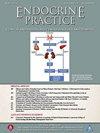处于肾上腺危机的肾上腺功能不全患者往往无法自行进行抢救注射。
IF 3.7
3区 医学
Q2 ENDOCRINOLOGY & METABOLISM
引用次数: 0
摘要
目的:肾上腺功能不全(AI)患者面临急性肾上腺危机和死亡的风险,特别是在疾病或创伤期间,可能需要快速使用肠外糖皮质激素(如氢化可的松(HC))进行治疗以控制危机。目前的指导方针建议在不断演变的危机中及时进行自我注射。人们对病人接受紧急注射的经历知之甚少。我们调查了肾上腺功能不全患者急诊注射成功的情况。方法:2022年,通过国家肾上腺疾病基金会网站对人工智能患者或其护理人员进行了一项关于管理肾上腺危机的经验的调查。他们报告了需要紧急注射皮质醇的肾上腺危机事件,注射的成功或失败,事件的背景和失败的原因。结果:近一半(41%)肾上腺素不足的患者无法自行进行紧急糖皮质激素注射,理由是他们的危机相关疾病的影响和混乱是主要障碍。注射失败导致不良结果(病情加重、需要住院治疗或死亡)的病例占36%。结论:对即将发生的肾上腺危机进行有效、及时的管理可以防止进展到住院、需要ICU护理的多系统衰竭和死亡。完全依赖患者自我注射可能会导致更糟糕的结果。治疗医生应包括对患者的注射教育和具体的技术实践指导,以及在危机中可能需要的援助。FDA对糖皮质激素自动注射器的批准,EMS临床医生、医院急救人员和其他医疗专业人员的更多参与,是未来成功管理肾上腺危机的关键。本文章由计算机程序翻译,如有差异,请以英文原文为准。
People With Adrenal Insufficiency Who Are in Adrenal Crisis Are Frequently Unable to Self-Administer Rescue Injections
Objective
Individuals with adrenal insufficiency (AI) are at risk of acute adrenal crisis and death, particularly during illness or trauma, and may require rapid treatment with parenteral glucocorticoid such as hydrocortisone to manage a crisis. Current guidelines recommend timely self-injection in an evolving crisis. Little is known about the patient experience with emergency injections. We surveyed people with AI regarding success with emergency injections.
Methods
In 2022 a survey was conducted through the National Adrenal Diseases Foundation website of individuals with AI or their caregivers about experience with managing an adrenal crisis. They reported on adrenal crisis events that required an emergency cortisol injection and the success or failure of the injection, context of the event and reasons for failure.
Results
Nearly half (41%) of adrenal insufficient patients were unable to self-administer an emergency glucocorticoid injection, citing effects of their crisis-associated illness and confusion as major barriers. Failed injections led to bad outcomes (sicker, need for hospitalization, or death) in 36% of cases.
Conclusions
Effective, timely, management of an impending adrenal crisis can prevent progression to hospitalization, multisystem failure requiring intensive care unit care, and death. Reliance solely on patient self-injection may result in worse outcomes. Treating physicians should include patient education about injections and specific practical instruction in the technique, as well as the potential need for assistance in a crisis. US Food and Drug Administration approval of a glucocorticoid autoinjector, greater engagement with Emergency Medical Services clinicians, hospital emergency staff, and other health care professionals, is key for future success in managing adrenal crises.
求助全文
通过发布文献求助,成功后即可免费获取论文全文。
去求助
来源期刊

Endocrine Practice
ENDOCRINOLOGY & METABOLISM-
CiteScore
7.60
自引率
2.40%
发文量
546
审稿时长
41 days
期刊介绍:
Endocrine Practice (ISSN: 1530-891X), a peer-reviewed journal published twelve times a year, is the official journal of the American Association of Clinical Endocrinologists (AACE). The primary mission of Endocrine Practice is to enhance the health care of patients with endocrine diseases through continuing education of practicing endocrinologists.
 求助内容:
求助内容: 应助结果提醒方式:
应助结果提醒方式:


